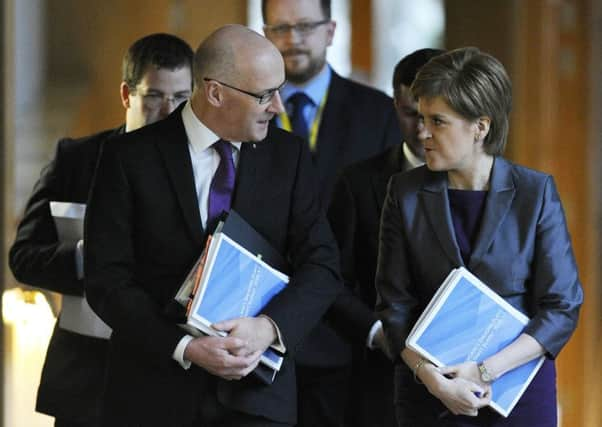Scott Macnab: New powers deal is bogged down in a lot of history


This was not long after being elected First Minister in 2007 and long before hostilities with the Whitehall money men reached ‘Defcon 1’ during the Scottish independence campaign. And herein lies the root of the current bitter dispute between the SNP government in Edinburgh and Westminster over the plans to bring sweeping new tax and welfare powers to Holyrood as part of the Scotland Bill. Scottish ministers are convinced that the fiscal framework which underpins the bill is flawed and that Scotland could lose out to the tune of billions of pounds – depending on population changes. Not so, claim Treasury chiefs, who say that with sweeping new tax raising powers comes responsibility and the inevitable risk that poor policy choices could see public finances suffer.
It may be meat and drink for economists and policy wonks as issues like per capita index modelling are thrust to the centre of political debate, but for the public at large it simply points to deadlock in this potentially historic opportunity to bring sweeping new powers to Scotland. And perhaps a sense of confusion as to why the SNP is not seizing this chance with both hands to further empower the Scottish Parliament.
Advertisement
Hide AdAdvertisement
Hide AdJohn Swinney is taking a hardline approach to these negotiations, but people need to see it from the wider perspective of the nationalist movement. The central role which the Treasury played in the referendum defeat just strengthened the belief in SNP circles that the department and its officials do not have Scotland’s best interests at heart. In a sense these talks are unfinished business from the referendum, when Salmond and co firmly believed the Treasury broke all sense of fair play and impartiality to openly campaign on behalf of the British state for a No vote. And the bete noir was the department’s top civil servant, the permanent secretary Sir Nicholas Macpherson, who has since retired. When Sir Nicholas broke with civil service convention and published his advice to the UK government on the folly of the SNP’s proposal for a currency union between an independent Scotland and the rest of the UK, it was seen as a cardinal breach of civil service rules on neutrality by Nationalists.
Of course this conveniently ignores the Nationalists’ own perceived manipulation of the civil service in Scotland, particularly the Scotland’s Future white paper on independence which was widely viewed as being blatantly partisan. The hostile mindset, so pervasive among Nationalists, was summed up by SNP MSP Joan McAlpine who stated last week: “I fear the outcome of this fight. The Treasury play dirty – especially where Scotland is concerned.”
Greg Hands, who recently took over as the Treasury’s new chief secretary after the May election, is known to be struggling to come to terms with the hardline approach to these negotiations from Edinburgh. There is, of course, a genuine concern that Scotland could lose out financially, but Swinney’s truculence is built on years of grievance at the hands of the Treasury. He won’t give an inch to this UK government department which so recently, as he sees it, illicitly colluded with the Tories to rob Nationalists of their dream of freedom.